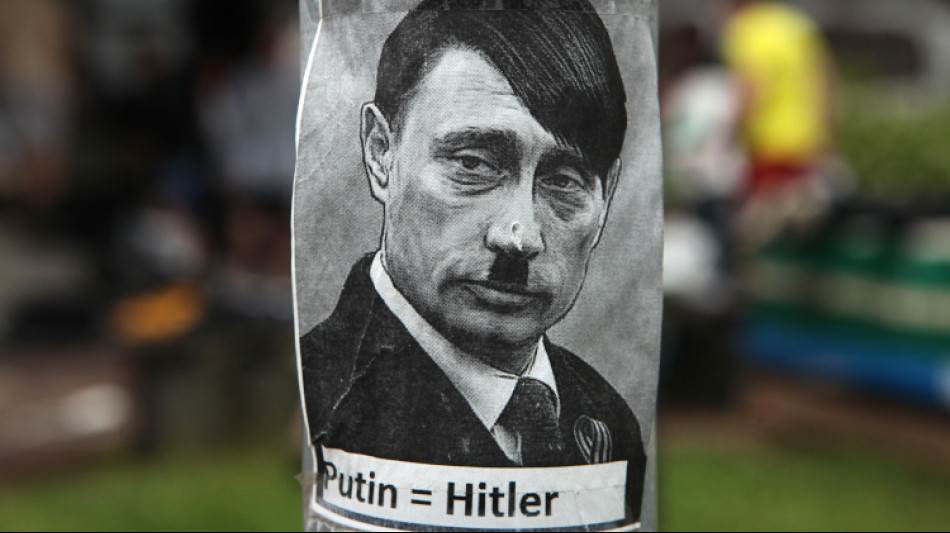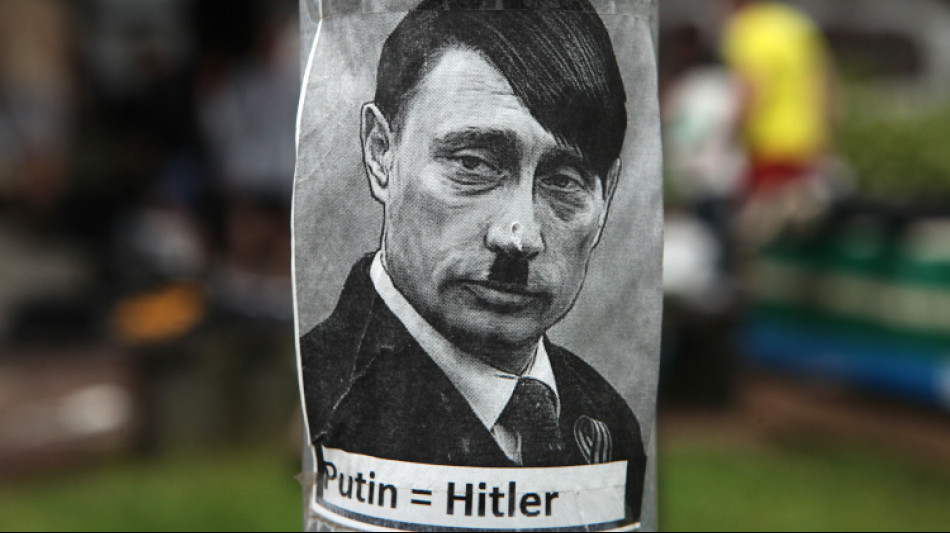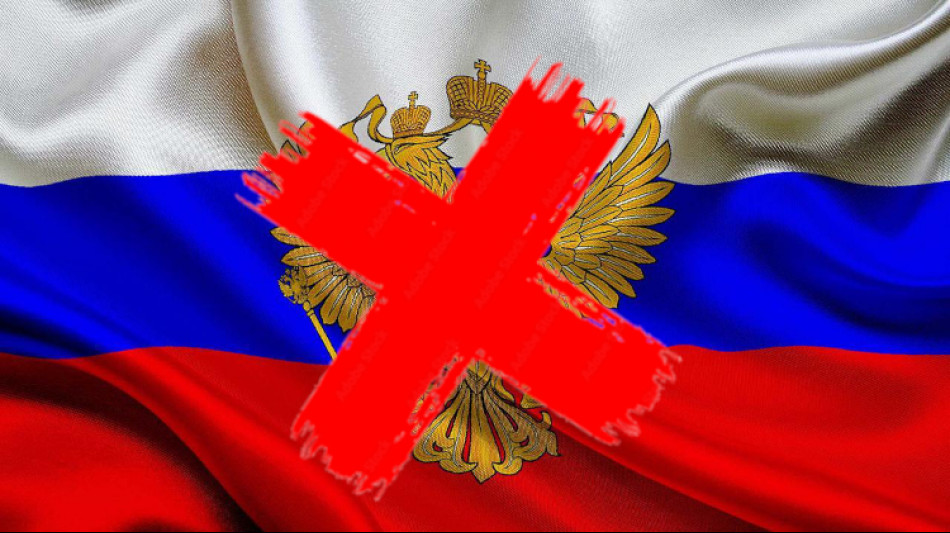-
 EU asylum applications down but Iran concerns mount
EU asylum applications down but Iran concerns mount
-
Rahm accuses DP World Tour of 'exorting players' with LIV deal

-
 Drones hit US embassy as vengeful Iran targets Mideast cities
Drones hit US embassy as vengeful Iran targets Mideast cities
-
Mideast war exposes fragile oil, gas dependency

-
 How the T20 World Cup semi-finalists shape up
How the T20 World Cup semi-finalists shape up
-
Oil extends gains and stocks dive as Middle East war spreads

-
 Warming El Nino may return later this year: UN
Warming El Nino may return later this year: UN
-
Trump says US-UK relationship 'not like it used to be'

-
 Eight years on, trial begins in Argentina submarine implosion
Eight years on, trial begins in Argentina submarine implosion
-
Beijing votes out three generals from political advisory body

-
 Oil extends gains and stocks dive as Iran conflict spreads
Oil extends gains and stocks dive as Iran conflict spreads
-
The French village where Ayatollah Khomeini fomented Iran's revolution

-
 South Africa, India eye T20 World Cup rematch as semi-finals begin
South Africa, India eye T20 World Cup rematch as semi-finals begin
-
Trump hosts Germany's Merz for talks eclipsed by Mideast war

-
 Second-hand phones surf rising green consumer wave
Second-hand phones surf rising green consumer wave
-
Pakistanis at remote border describe scramble to leave Iran

-
 China votes to oust three generals from political advisory body
China votes to oust three generals from political advisory body
-
Murray scores 45 as Nuggets hold off Jazz

-
 Five things about the 2026 F1 season
Five things about the 2026 F1 season
-
Scrum-half Gibson-Park: Ireland's 'petit general'

-
 Geopolitical storm leaves isolated Greenlanders hanging by a telecoms thread
Geopolitical storm leaves isolated Greenlanders hanging by a telecoms thread
-
Myong hat-trick as North Korea cruise at Women's Asian Cup

-
 AI disinformation turns Nepal polls into 'digital battleground'
AI disinformation turns Nepal polls into 'digital battleground'
-
New Israel, Iran attacks across region: Latest developments in Middle East war

-
 China's overstretched healthcare looks to AI boom
China's overstretched healthcare looks to AI boom
-
Oil extends gains and stocks drop as Iran conflict spreads

-
 Rituals of resilience: how Afghan women stay sane in their 'cage'
Rituals of resilience: how Afghan women stay sane in their 'cage'
-
Strait of Hormuz impasse squeezes world shipping

-
 Fresh Israel, Iran attacks across region: Latest developments in Middle East war
Fresh Israel, Iran attacks across region: Latest developments in Middle East war
-
Oscar-nominated Iranian doc offers different vision of leadership

-
 Oscar-nominated docs take on hot-button US social issues
Oscar-nominated docs take on hot-button US social issues
-
'I couldn't breathe': The dark side of Bolivia's silver boom

-
 Trump warns of longer Iran war as Riyadh, Beirut hit
Trump warns of longer Iran war as Riyadh, Beirut hit
-
Underground party scene: Israelis celebrate Purim in air raid shelters

-
 Flowers, music, and soldiers at funeral of drug lord
Flowers, music, and soldiers at funeral of drug lord
-
'Safety and wellbeing' will guide F1 Mideast planning: FIA chief

-
 Trump to attend White House Correspondents' dinner
Trump to attend White House Correspondents' dinner
-
Will Iran's missiles drain US interceptor stocks?

-
 Trump warns of longer Iran war as violence spreads
Trump warns of longer Iran war as violence spreads
-
Energy infrastructure emerges as war target, lifting prices

-
 Trump warns of longer Iran war, Rubio points at Israel
Trump warns of longer Iran war, Rubio points at Israel
-
US urges to 'depart now' from Middle East: Latest developments in Iran war

-
 Ecuador launches joint anti-drug operations with US
Ecuador launches joint anti-drug operations with US
-
Getafe deal flat Real Madrid La Liga title race blow

-
 Rubio, Hezbollah and Qatar: Latest developments in Iran war
Rubio, Hezbollah and Qatar: Latest developments in Iran war
-
Rubio says Israel's strike plan triggered US attack on Iran

-
 'Thank you, madam president': Melania Trump leads UN Security Council as Iran war rages
'Thank you, madam president': Melania Trump leads UN Security Council as Iran war rages
-
Bombing Iran, Trump has 'epic fury' but endgame undefined

-
 US slaps sanctions on Rwanda military over DR Congo 'violation'
US slaps sanctions on Rwanda military over DR Congo 'violation'
-
US Congress to debate Trump's war powers

South Korea: Yoon Suk Yeol shocks Nation
South Korea in Crisis: President Yoon Suk Yeol's Coup Shakes the Nation
In a stunning and unprecedented move, South Korean President Yoon Suk Yeol has attempted to seize absolute power, plunging the nation into political chaos. On the night of December 3, President Yoon declared martial law, suspended the National Assembly, and deployed soldiers to surround its premises, effectively paralysing the country’s democratic institutions. The world is watching in shock as one of Asia’s most stable democracies faces an uncertain future.
The Coup: A Nation in Shock
The events unfolded rapidly on a cold December night, leaving South Koreans and the international community reeling. President Yoon cited national security threats and alleged internal dissent as justification for his actions, but critics are calling it a blatant power grab. By suspending the National Assembly—South Korea’s legislative body—Yoon has undermined the very foundation of the nation’s democratic system.
Eyewitnesses reported heavy military presence in the capital, Seoul, as soldiers and armoured vehicles took positions near government buildings. Communication networks were temporarily disrupted, adding to the confusion. The swift and calculated nature of the coup suggests months of planning, raising questions about who within the government and military may have supported the move.
Immediate Reactions: Outrage and Resistance
The coup has sparked widespread outrage among South Koreans. Protesters took to the streets in major cities, waving banners and chanting slogans calling for Yoon’s resignation. Opposition leaders condemned the move as a betrayal of the democratic values South Korea has upheld since its transition from military rule in the 1980s.
International leaders, including the US-President Joe Biden who is still in office until 20 January 2025 and Japanese Prime Minister Fumio Kishida, have expressed grave concern. The United Nations has called for an emergency session to address the situation, while human rights organisations warn of potential crackdowns on dissent.
What Led to This Crisis?
President Yoon’s tenure has been marked by polarising leadership and a growing divide between conservatives and progressives. Critics argue that his administration’s inability to address pressing economic challenges, such as rising housing costs and youth unemployment, eroded public trust. Yoon’s approval ratings had plummeted in recent months, and his administration faced mounting scrutiny over alleged corruption scandals.
While Yoon’s justification for the coup includes vague references to national security threats, experts believe the move was motivated by a desire to cling to power amidst growing opposition. Some speculate that internal disagreements within his party and the prospect of impeachment may have pushed Yoon to take drastic action.
The Role of the Military
The military’s involvement in the coup is particularly troubling for a country with a history of authoritarian rule. South Korea transitioned to a democracy in 1987 after decades of military dictatorship, and the armed forces have since remained apolitical. Yoon’s ability to mobilise the military raises questions about divisions within the armed forces and whether dissenting voices exist among its ranks.
Should significant portions of the military oppose Yoon’s actions, the possibility of a counter-coup or internal conflict could further destabilise the nation.
Implications for South Korea’s Future
The attempted coup casts a shadow over South Korea’s hard-earned reputation as a thriving democracy. Its political stability and economic strength have made it a key player in the global arena, but this crisis threatens to derail decades of progress.
Domestically, the suspension of democratic institutions could lead to widespread unrest, civil disobedience, and a protracted power struggle. Economically, investor confidence is likely to plummet, jeopardising South Korea’s status as a global technology and trade hub.
On the international stage, the coup could strain alliances, particularly with the United States, which has long regarded South Korea as a crucial ally in countering North Korea and maintaining regional stability. China and North Korea, meanwhile, may view the situation as an opportunity to exploit South Korea’s weakened state.
The Road Ahead: Democracy or Dictatorship?
The fate of South Korea now hinges on the response of its citizens, political leaders, and international allies. Opposition parties have called for immediate action to restore democracy, including mass protests and legal challenges. Meanwhile, world leaders face the delicate task of pressuring Yoon’s government while avoiding escalation.
The unfolding crisis serves as a stark reminder that even the most established democracies are not immune to authoritarian tendencies. For South Korea, the road ahead is fraught with uncertainty, but its people have shown resilience before. Whether the nation emerges from this crisis as a stronger democracy or succumbs to authoritarian rule will shape its future—and its place in the world—for generations to come.

Террористическое государство Россия: Вагнеровцев не хотят хоронить!

Вам пришла повестка на Госуслугах. Что делать?

Россия: Людмила Путин зарабатывала на долгах

Video: Here you can see Russia's terror in Ukraine!

USA: Biden to announce Australia submarine deal in San Diego

Iranian dictatorship confirms death sentence for Swedish citizen

Ukraine: Bakhmut at the centre of the fight against Russia's terror?

Arms imports to Europe have risen sharply, new report finds

Ukraine war: Russia's regime launches missile attacks

Confetti and fried doughnuts: Beautiful carnival in Venice

Moldova: Russia and his anti-social hybrid war!




